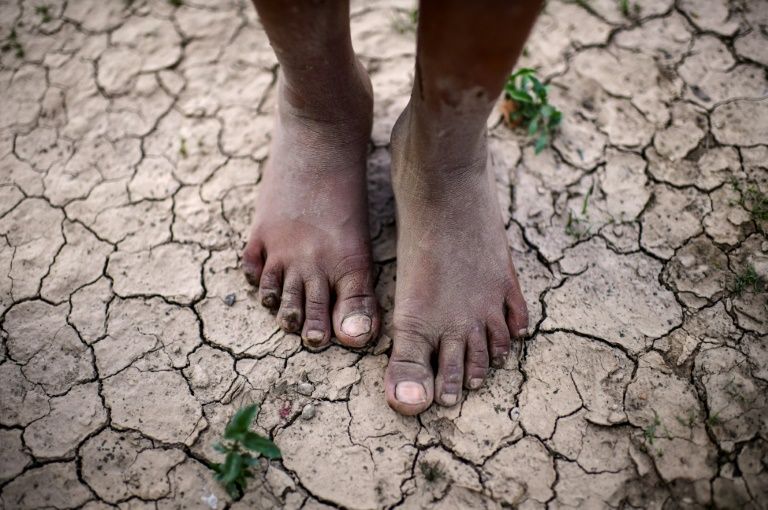In parched and dusty villages in northern Argentina, children have been dying of hunger and disease linked to a lack of clean water and nutrition, despite living in one of Latin America’s richest economies.
Community leaders say that since January, eight children have died of malnutrition in an isolated indigenous area in northwestern Salta province, the country’s poorest.
For Valerio Cobos, chief of the Wichi community that is losing its children, his people’s extreme poverty is the result of white repression of indigenous people during the last century.
“For the whites, we are less than rubbish,” he told AFP.
Cobos said that eight children had died of hunger and two others from health problems associated with a lack of clean water and food in his scattered community.
Cobos is leader of around 50 families living on the outskirts of Embarcacion, a northern town built on lands the Wichis claim as theirs.
The spate of child deaths has prompted the local government to declare a health emergency and pledge to improve water treatment and supply in the region.
A complicating factor is that many of the community’s women only speak the Wichi language and avoid going to health centers or hospitals where there are no interpreters.
No Clean Water
In a hospital on Argentina’s border with Brazil and Paraguay, a five-year old girl died recently in the arms of visiting state health minister Josefina Medrano.
“I am a pediatrician, I trained to take care and ensure the health of children. It is a desperate situation,” the minister told local newspapers following the child’s death.
Armed with such raw experience, Medrano has promised to work to improve the lives of Wichis in the province, but conceded that it would take time.
“This has been going on for many years in Salta. So far no government has remedied the situation.”
Indigenous Argentines make up less than three percent of the country’s population, with the majority living in Salta, most of them Wichi scattered in rural areas and surviving on the sale of coal and handicrafts.
Mision Chaquena, around 200 miles north of the city of Salta, is the largest Wichi community with about 8,000 inhabitants.
Rodolfo Franco, a doctor from Buenos Aires who runs its sole health center, says the situation is stark.
“People are dying of hunger and thirst, of malnutrition, dehydration, lack of work and lack of a future,” Franco told AFP.
His ramshackle hospital provides what little comfort it can, but lacks even the most basic equipment.
The bed used for maternity patients broke in half years ago and the midwife, Balbina Gutierrez, says she is hopeful of getting a replacement, but there are other priorities.
“We need sheets, the ones we have are very ragged,” she said “And disinfectant!”
There is no ambulance. The nearest one is kept at another clinic 30 miles away by dirt road.
“There are no heaters or fans,” said Franco. Nor is there time off: he is the only doctor.
The more fortunate families in the poor community have electricity, but the simple homes have no running water. Outbreaks of diarrhea, vomiting and parasitic diseases are frequent. Dengue fever is a constant problem.
The village has a primary and a secondary school, but faced with extreme poverty, many children stop attending.
“The clothes! The shoes! If you don’t have enough to eat, you can’t!” said Elsa Rojas, an illiterate mother with two children.
Drink or Die
In Mision Chaqueta, the Wichis store rainwater or take it from a pipe that provides running water for a few hours a day.
“The water comes out with red worms in it, sometimes it’s yellow and leaves the containers black — see?” says Maria, a local woman.
People use the pipe to fill up the containers — plastic herbicide drums discarded by neighboring farmers, on whose irrigated lands grow tomatoes and peppers.
“We want good water to drink, to make a vegetable garden,” says Rojas.
Worms and tiny insects flit across the surface of the water. Rojas scooped some up with an old food can, used the sleeve of her blouse as a filter, and drank.
Local authorities have deployed water treatment units to ease the community’s plight. A children’s nutritional recovery center with 12 beds is operating in the area and the Red Cross has pledged assistance.
But in Mission Chaquena, people are still waiting for tangible signs of improvement.
Wichi teacher Rosa Rodríguez is worried about the lack of hope in the community.
“Since January, four teenagers committed suicide,” she said. “We need young people to continue studying.”
The most recent suicide was two weeks ago when a teenage boy hanged himself from a tree.
For Nora Segundo, Wichi community leader of the neighboring village of Carboncito, time is running out for a more hopeful future.
“How long are we going to wait and keep waiting and waiting. There are many dead kids. My four-year-old girl is malnourished. I don’t know what to do.”


















